|
|
|
Sort Order |
|
|
|
Items / Page
|
|
|
|
|
|
|
| Srl | Item |
| 1 |
ID:
124466


|
|
|
|
|
| Publication |
2013.
|
| Summary/Abstract |
Renewable energy is becoming a priority for Latin America and Caribbean (LAC) countries because of energy challenges such as demand growth, high dependence on imported fossil fuels, and climate change. As of 2010, 12 LAC countries have implemented formal targets for renewable energy deployment. Some of the LAC countries, namely Argentina, Dominican Republic, Ecuador, Honduras, and Nicaragua, are using feed-in tariffs (FITs) to promote renewables. FITs are long-term, guaranteed purchase agreements for green electricity at a price that can provide project developers a reasonable return on investment. FITs are increasingly popular because if designed well, they can mitigate investor risk in renewables. This article presents a low-risk FIT design and then uses this design to benchmark the existing LAC region FITs.
|
|
|
|
|
|
|
|
|
|
|
|
|
|
|
|
| 2 |
ID:
189256
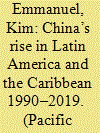

|
|
|
|
|
| Summary/Abstract |
To date, perceptions of China's rise in relation to US hegemony in the international realm has not escaped scholarly scrutiny. For the period 1990–2019, the International Relations literature has made a somewhat copious contribution to the broader debates on the US and China. Within the Sino-Latin America Caribbean (LAC) discourse, the implications of China's ascent for US interests in the region is an underlying concern. The region is considered salient in broader power configurations as a result of its geostrategic positioning in relation to the US. However, perceptions pertaining to the triad of interests in the space account largely for powerful states in the dynamic. Despite the ambiguous perceptions associated with a rising China in the international realm and the Latin America Caribbean region's strategic position, rather than being preoccupied with ideas of the ‘China threat’, these states appear to have largely bypassed the more threatening rhetoric associated with China's rise in the period under scrutiny. In seeking to bring Latin America and Caribbean states into the discourse, the article examines how benign perceptions shaped the region's relationship with China. The argument is made that Latin America and Caribbean states sought to frame and navigate their relationship with China largely on the premise of economic opportunity amidst a firmly embedded US role inside the region which further repudiated ideas of the ‘China threat’ in the engagement. In unpacking the argument, the discussion seeks to show that more favourable images of China's economic ascent punctuated LAC states responses to China and that such states have been driven by a high level of economic pragmatism in the relationship. It also illustrates that the underlying hegemonic order has practical effects and more subtle manifestations inside LAC states which mitigated against perceptions of threat in China's rise in the region.
|
|
|
|
|
|
|
|
|
|
|
|
|
|
|
|
| 3 |
ID:
107502
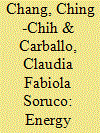

|
|
|
|
|
| Publication |
2011.
|
| Summary/Abstract |
This study examines the causal relationships among energy consumption, economic growth and carbon dioxide emissions in twenty countries from Latin America and the Caribbean region. The methodology includes the use of Phillips and Perron (PP) tests, a cointegration model with vector error correction modeling (VECM) and vector autoregression (VAR) with Granger causality. The study concludes that of the twenty countries analyzed, only in four of them will it be possible to implement energy conservation polices without affecting their economic growth, four others are not able to consider an energy conservation policy with economic growth, and the other twelve should focus on their economic growth before adopting any conservation policies. Energy efficiency was found in this region, especially in the countries which have both cointegration and short-term equilibrium.
|
|
|
|
|
|
|
|
|
|
|
|
|
|
|
|
| 4 |
ID:
189021
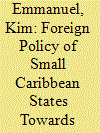

|
|
|
|
|
| Summary/Abstract |
Conventional wisdom suggests that small states’ foreign policies are constrained in several ways. These may be confined to size, material resources, geopolitical positioning and limited participation in inter-state affairs. Yet, despite their diminutiveness, small Caribbean states appeared to have acted with surprising dynamism in seeking to promote and uphold relations with China in an unlikely period, the bipolar era. Drawing from official records of their interactions and other documentary sources, these states showed themselves to be quite willing to transcend their various limitations and become rather active participants on issues aligning with their interests in the international sphere. This paper examines how policy-making between the Caribbean region and China unfolded and why it evolved the way it did. It argues that acting through the more ideational context of the Cold War era, policymakers within the Caribbean region implemented strategies and policies premised on shared ideals of Third World solidarity to further relations with China. In embarking on this analysis, two main contributions are envisaged. First, the paper addresses the knowledge gap on small Caribbean states’ foreign policy decision-making vis-à-vis China in the Cold War era. Second, interrogating the dynamic provides a unique opportunity to challenge the received wisdom on small states’ foreign policy behavior in line with an emphasis on small states agency amidst internal and international constraints.
|
|
|
|
|
|
|
|
|
|
|
|
|
|
|
|
| 5 |
ID:
135188
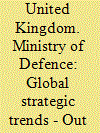

|
|
|
|
|
| Edition |
5th ed.
|
| Publication |
United Kingdom, Ministry of Defence, 2014.
|
| Description |
xxv, 172p.Pbk
|
| Series |
Strategic Trends Programme
|
|
|
|
|
|
|
|
|
|
|
|
Copies: C:1/I:0,R:0,Q:0
Circulation
| Accession# | Call# | Current Location | Status | Policy | Location |
| 058018 | 355/UNI 058018 | Main | On Shelf | General | |
|
|
|
|
| 6 |
ID:
180069
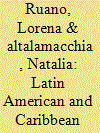

|
|
|
|
|
| Summary/Abstract |
Covid-19 arrived in Latin America in a context of ideological polarisation among national governments and internal socio-political turmoil, which bode badly for its numerous and overlapping regional groupings. However, in a manner suggested by functionalist theories, some of them have “found refuge” in technical/expert cooperation and side-stepped political paralysis with different degrees of success. With institutions and previous experience in health issues, CARICOM and SICA had a significant role in the management of the pandemic, while CELAC revived by promoting technical cooperation. In contrast, MERCOSUR failed to overcome the political rift among its members, so technical cooperation occurred, yet remained limited.
|
|
|
|
|
|
|
|
|
|
|
|
|
|
|
|
| 7 |
ID:
126779
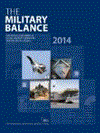

|
|
|
|
|
| Publication |
London, Routledge, 2014.
|
| Description |
504p.Pbk
|
| Standard Number |
9781857437225
|
|
|
|
|
|
|
|
|
|
|
|
Copies: C:1/I:0,R:0,Q:0
Circulation
| Accession# | Call# | Current Location | Status | Policy | Location |
| 057561 | 355.055/IIS 057561 | Main | On Shelf | General | |
|
|
|
|
| 8 |
ID:
138711
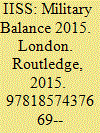

|
|
|
|
|
| Publication |
London, Routledge, 2015.
|
| Description |
504p.Pbk
|
| Standard Number |
9781857437669
|
|
|
|
|
|
|
|
|
|
|
|
Copies: C:1/I:0,R:1,Q:0
Circulation
| Accession# | Call# | Current Location | Status | Policy | Location |
| 058207 | 355.055/IIS 058207 | Main | On Shelf | Reference books | |
|
|
|
|
|
|
|
|
|